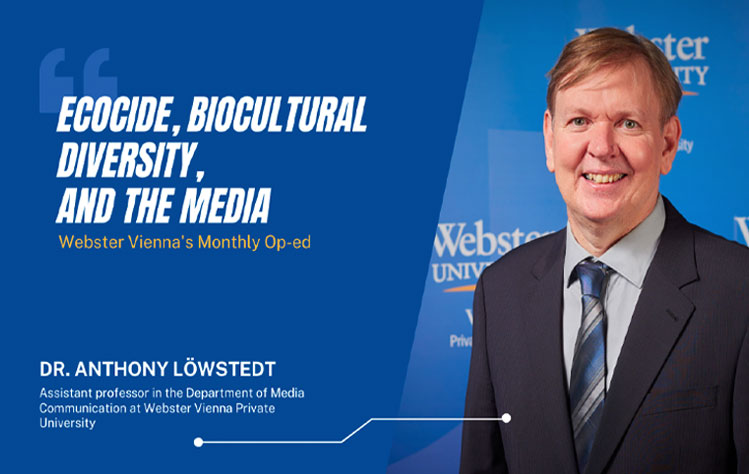Ecocide, Biocultural Diversity and the Media
April 07, 2022
In his latest commentary, Dr Anthony Loewstedt, assistant professor at Webster Vienna Private University, tries to explain how a new kind of crime has come onto the agenda of the International Criminal Court, so-called ecocide, which does not necessarily directly or immediately victimize human beings. He tries to work out the communication relationships and what role the media will play in the coming debates on ecocide, biocultural diversity and the media.

International criminal law consists of laws addressing the worst offenses, such as crimes against humanity, genocide, apartheid, enslavement, torture, war crimes and acts of aggression (one state or country attacking or threatening another). All of these are concerned with harms done to people, mainly through the actions of states or their representatives.
In the past year, however, a new sort of crime has arrived on the agenda of the International Criminal Court (ICC). Ecocide does not necessarily victimize humans directly or immediately. This would be unique in international criminal law. Yet, in principle, it could be classified as an even more serious kind of crime than a crime against humanity, namely, as a crime against Life itself. How does this relate to communication and what roles will the media play in upcoming debates on this topic?
It has already become law in France, where the crime of écocide may now be punished with prison sentences of up to ten years, and in several other countries. It has good prospects for making it into the ICC by being added to the Rome Statutes, although that process will be very slow. It is estimated to take years for it to go through the necessary stages. If or when it becomes international law, any person can be arrested if ICC prosecutors believe they are or have been committing, or are about to commit, ecocide.
Ecocide means intentionally causing or enabling significant environmental harm, for example burning large quantities of fossil fuels, releasing poisons that destroy sizable habitats, killing protected species or cutting down vast swathes of climate-critical forest. An international ecocide law will make individuals responsible for acts or decisions that cause severe damage to the environment anywhere liable for criminal prosecution.
Currently, companies found guilty of causing environmental harm are mainly punished through fines or suing. But redress and punishment have usually been insufficient, slow or non-existent, and (co-)responsible states or state representatives were hardly ever punished. In theory, even entire corrupt governments will not be able to protect wrong-doers once ecocide joins the ranks of the other most serious crimes in international law.
Today, people — especially indigenous people — are killed for protecting the planet. But there are no or only few repercussions for the people who are killing the planet. Last year, 227 land and environmental defenders were reportedly murdered because of their activities to save their natural environment. And despite constituting only five percent of the global population, one in three of those killed was from a First Nation or indigenous community.
The criminalization of ecocide therefore harmonizes well with criminalization of (other) offenses that cause harm to people. Criminalizing ecocide worldwide would be anti-ethnocentric as well as anti-anthropocentric. And conversely, defending and promoting sustainable development and biodiversity often amounts to the same as defending and promoting cultural diversity. Those murdered environmental defenders all opposed monoculture, in both meanings of the word. This is also reflected, for example, in the United Nations’ 2030 Agenda for Sustainable Development.
In parallel, natural and social scientists are striving to create a reliable biocultural diversity index in order to measure biocultural diversity in a fair and accurate way, so that we can develop policies and strategies to achieve biocultural diversity, increase it, and also more easily find indications when it becomes urgent to reverse destructive developments. The London-based Media Diversity Institute is one of several nongovernmental organizations working towards the same long-term goal, specializing on the news media.
Critical and factual news reporting will be crucial for the success of these revolutionary directions in law, justice, ethics, and scientific research. It will not be easy. Indications, standards and techniques used to decide if acts are ecocidal or not must be developed by science but also used and analyzed critically by law enforcement, news media, and the public, in order for the world to make this new form of justice fair and effective. What is an ecocidal mindset? What is the level of intention required, and what makes a disaster large enough to be considered as ecocide? These are not questions that will always be easy to answer. But that is also the case with other aspects of international criminal law. How much unpaid work, for example, constitutes enslavement?
The media must themselves also be accountable to, and representative of, their stakeholder populations, and with regard to ecocide, those constituencies are not going to end at national, religious or linguistic borders. There may have to be much more human and cultural diversity, especially among the media owners, but also on other levels of the media organizations, for the international ecocide legislation and adjudication to work well. There may also have to be a freer flow of information and more transparency in business and government, less fake news, less greenwashing and more respect for science.
Not only in the media and in communication: diversity matters wherever you work, wherever you are. Organizations and systems that ignore, lack, limit or reject diversity are actually those that are most likely to fail. Not just the future of humanity may hinge upon this new legislation and its implementation.
About Author
Dr. Anthony Loewstedt is an Assistant Professor in the Department of Media Communication at Webster Vienna Private University, where he teaches media ethics, media theory, media law and communication. He has published research papers in each of these areas.
